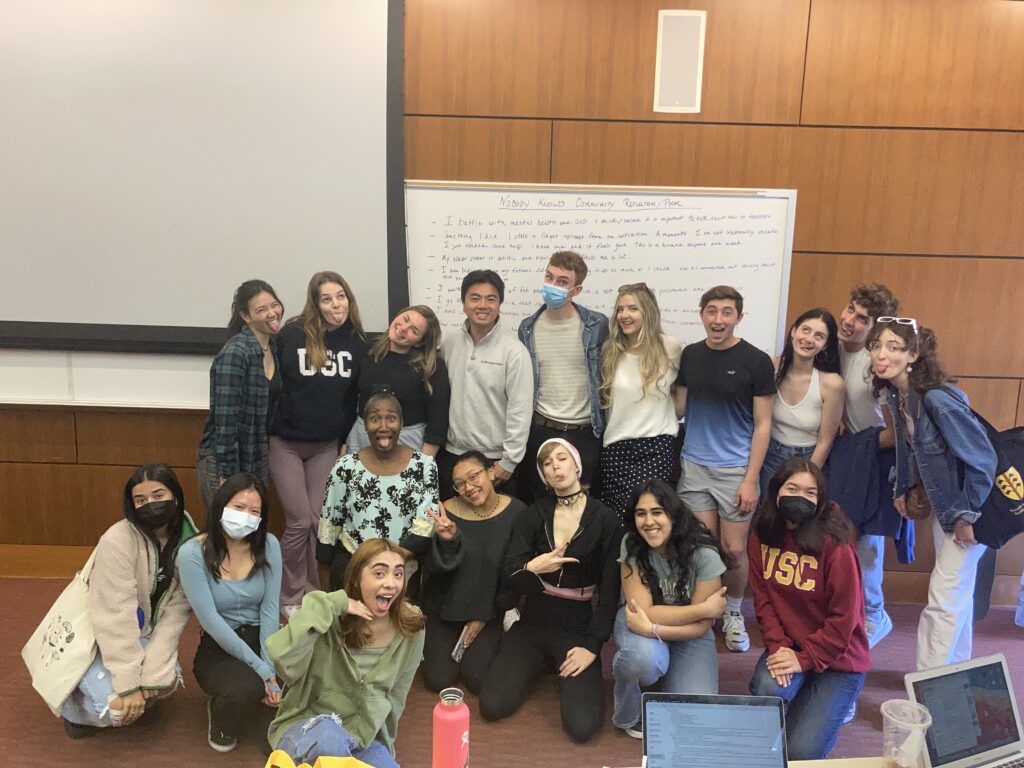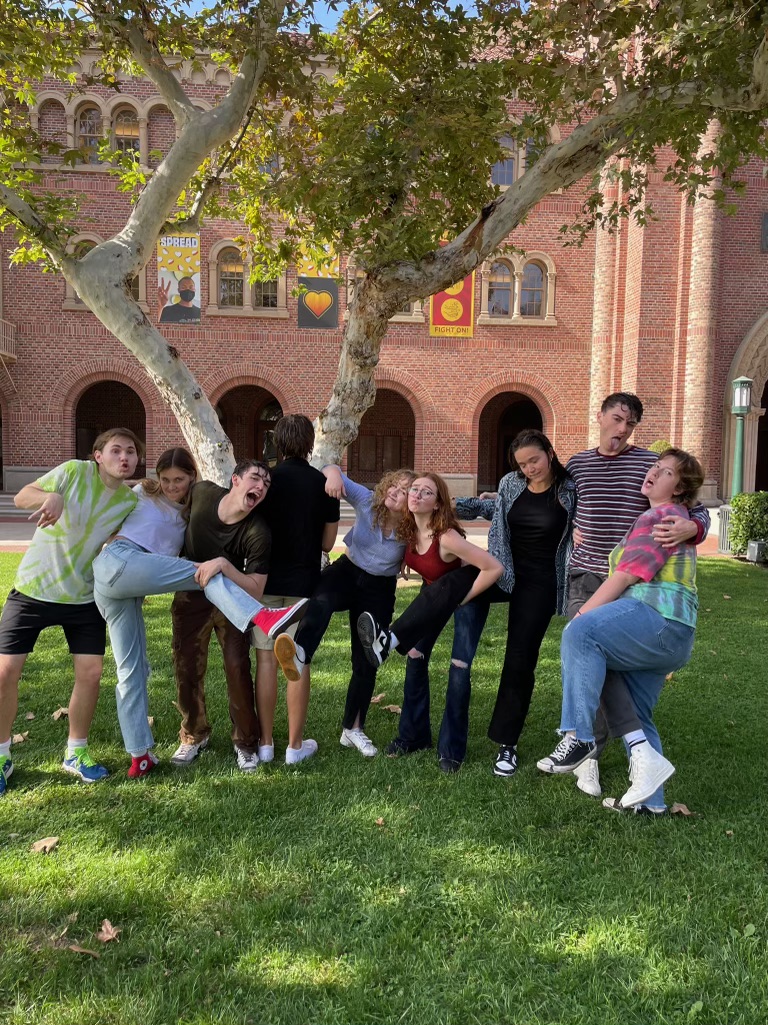An education at the USC School of Dramatic Arts provides opportunities for students to learn and train, to perform and create, to take risks and to grow in their craft. But once they graduate, like all artists, students must showcase a high level of entrepreneurialism to make their art.
The USC independent student production community has been helping student-artists bring their entrepreneurial spirit into reality for decades. These productions are student-run on every level: choosing the performance material and obtaining the rights to produce the work, finding venues, designing and crafting sets and costumes, holding auditions, rehearsing, and finally putting on performances and marketing them to the community.
Another completely student-run endeavor at SDA is the Theatre Students Association (TSA), an organization that has served as a voice for SDA students for many years. TSA collaborates with SDA administration and meets regularly with the Dean’s office to represent the interests and needs of the students. Representatives from TSA sit on the School’s Literary Committee each year to help select the season of mainstage productions. TSA Vice President Cristal Molina (BA Theatre ‘23) commented that serving on the Literary Committee allows TSA to provide insight on what students are looking for when a season is selected.
“I find it imperative that we as students continue to advocate for plays where everyone can see themselves represented, not just the majority,” Molina said.
TSA’s president, Erica Ammerman (BA Theatre ‘23), stressed the pivotal role that TSA plays in helping the ISP companies create productions independently.
“We are a team that serves to support students as they create student art through independent student productions,” Ammerman said. “As students, we work towards lending a hand so we can bring stories to life.”
Over the last year, TSA ISP Co-Chairs Zoe McCracken (BFA Technical Direction ’24) and Bita Aghaee (BA Theatre ‘23) spearheaded a project to set up a digital resource for the ISP companies, offering channels for communication, and answers to frequently asked questions for the more than 15 ISP groups on campus. This project was created to help students understand the processes for producing ISPs, to overcome common obstacles they may face, and to encourage communication between the student production groups and SDA.
The students understand that these ISPs help them flex different creative muscles than the mainstage productions. “It’s so beautiful, the shows that they put on,” Aghaee said. “Each ISP represents a different part of theatre. I definitely always have my ears open when people say, ‘I want to work on a show but I don’t know where to start.’ I say, here’s a list of ISPs.”

Facilitating communication and logistics
The ISPs add something unique and valuable to SDA student life that complements the work they are pursuing as part of their curricular classes and assignments. ISPs create new opportunities for students to create the type of art they may not be able to find on the mainstage, and help younger students receive mentorship from older students early in their training.
“They’re the only opportunity that students have to production manage and produce as part of a student organization,” McCracken noted. “It also allows for student designers, and most companies also have mentors, and the mentors are students. So it gives opportunities for freshmen and sophomores to design and stage manage, when they might otherwise not get an opportunity until their junior or senior years.”
But the ISPs’ status as entirely student-run can create unique challenges for students putting on these shows. Space is at a premium across the university, so one main concern is finding a venue. Though the situation should improve after SDA moves into its new building in the ’23-’24 academic year, the resources TSA has gathered provide students with opportunities to connect with potential spaces they may not have considered.
“Venues has been a big one, because a lot of the groups have been struggling with that,” Aghaee said. The resources put together by TSA help expand that network and find new places for students to perform around campus, and also help students with other challenges like securing financial resources to put on productions, as well as finding ways to communicate with and learn from students in other ISPs.
Guidelines for creating comfortable environments for students within the ISP community is another major priority that the resources gathered online have helped facilitate. “We just want to make sure that everyone’s creating a healthy environment,” Aghaee said. Now there is an aggregated list of answers and resources, a “one-stop shop” where they can find information.
Facilitating logistical communication between ISPs was just as important.
“Because one group might load out on 4pm on Sunday and the next group is loading in at 6pm on Sunday, we were trying to ease that transition and bridge that gap for those companies so they can work better together,” McCracken said. “Anything to get these groups into a position where they can just focus on creating theatre and not worrying they can’t do it because of a logistical thing beforehand.”
TSA has also placed a major emphasis on Equity, Diversity, Inclusion and Accessibility, working to put policies and guidelines in place to make sure everyone gets an opportunity and feels welcome in these productions.
“We’re making sure our shows are inclusive, that everyone’s getting equal opportunities,” Aghaee said. “Our EDIA team is working really tirelessly to make sure things are going the way we want them to.”

“We’re on your side.”
While McCracken and Aghaee spent the summer compiling the initial hub of resources, maintaining it is just as important: it is a living library of useful information and resources, which grows any time an ISP encounters a new problem to solve.
“There’s always new stuff that needs to be added, because there’s always new problems and questions to be answered,” Aghaee said. “Zoe and I are pretty good about listening for when there are concerns, so that way we know when to take the next steps, when to contact admin – hey, what do we do to fix this problem? Growing the drive is about listening to the concerns from the ISPs, things they might need help with, things we might not have thought of and saying, hey, we should put some resources behind that.”
McCracken and Aghaee felt passionate about the work that TSA is doing to continue supporting ISPs on campus.
“We’re on your side,” Aghaee said. “We’re doing what we can to make them feel supported, providing resources, providing communication between them and faculty, doing what we can to solve any issues that arise.”
McCracken and Aghaee also had a message for any younger students thinking about getting involved with an ISP:
“Just do it!”
This is the first in a new monthly series of articles about the student groups and Independent Student Production companies at SDA.
